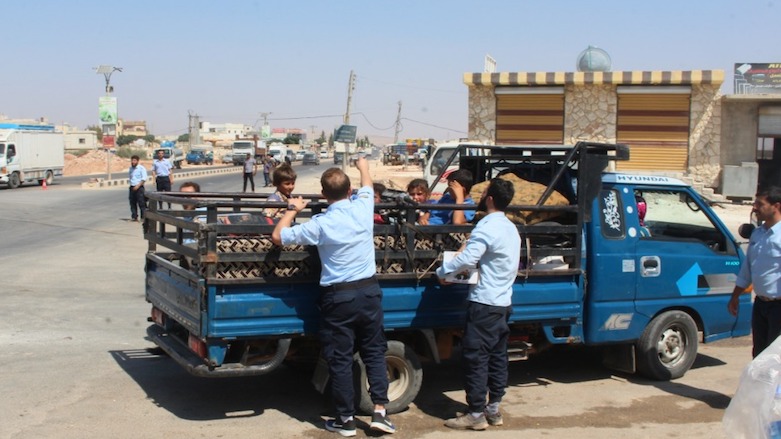Idlib offensive temporarily paused ahead of Geneva talks

ERBIL (Kurdistan 24) – On Wednesday, no airstrikes hit the province of Idlib ahead of new talks in Geneva despite earlier Syrian government threats they would launch an assault on the region.
“There were no warplanes, but some ground shelling, but no airstrikes,” Mahmoud Abbi, a spokesperson for the Free Idlib Police, told Kurdistan 24 on Tuesday.
“The emigration movements somehow are stopped after the security council conference,” he added. “Today there are no bombings by Assad warplanes.”
This, while on Monday there were still airstrikes causing thousands of civilians to flee.
The United Nations said that so far, 30,000 people had already fled the Russian and Syrian government bombardments in Idlib.
The Syrian Observatory for Human Rights (SOHR) also confirmed the absence of warplanes and helicopters for the last 55 hours, except for overflights by reconnaissance planes over Idlib.
SOHR reported that the pause in airstrikes is the result of a “Russian – Turkish truce in Hama, Aleppo, Idlib, and Latakia.”
Now, supporters of the opposition in Idlib are preparing a protest on Sept. 14 for the overthrow of the Syrian government.
“The Free Idlib Police have planned to secure the protests next Friday, to participate in those demonstrations,” Abbi said.
The Syrian government previously indicated it was ready to launch an assault on rebel-held northwestern Idlib, which according to the UN could displace over 700,000 people.
The UN’s humanitarian chief, Mark Lowcock, warned Monday that a government assault could create “the worst humanitarian catastrophe” of this century.
But after Turkey failed to convince Russia and Iran to back a ceasefire in a meeting on Sept. 7, the Idlib operation seems to be paused temporarily to allow rebels a chance to talk or surrender. If no agreement is reached, an intensified assault will follow.
Ankara is now increasing its troop presence on the ground in Syria and is reportedly sending more support to rebels to fight the Syrian government, according to a Reuters report.
“Turkey is organizing rebel forces and may redeploy rebel proxies from Afrin and Euphrates Shield areas to fight in Idlib,” Jennifer Cafarella, a senior intelligence planner at the Institute for the Study of War, told Kurdistan 24.
The UN envoy for Syria hosted senior Russian, Turkish, and Iranian officials on Sept. 10-11 in Geneva. Those talks will continue on Sept. 14 with senior delegations from Egypt, France, Germany, Jordan, Saudi Arabia, Britain, and the United States.
Meanwhile, the US warned Damascus and Russia again on Tuesday not to carry out the Idlib assault.
“Turkey learned this lesson last week when they met with Russia and Iran. Turkey wanted them to agree to a ceasefire in Idlib. But Russia and Iran rejected Turkey’s request. And the Assad regime continued its brutal attacks,” US Ambassador to the United Nations Nikki Haley said during the UN Security Council meeting in New York.
She called on Russia to stop “the catastrophe looming in Idlib,” adding America considers any assault on Idlib “to be a reckless escalation of the conflict.”
“If Assad, Russia, and Iran continue down the path they are on, the consequences will be dire. The world will hold them responsible. And no number of Security Council meetings will ever change that.”
Editing by Karzan Sulaivany
